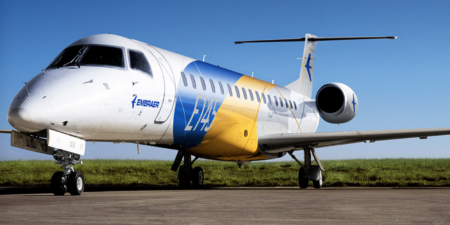United Airlines’ venture capital fund, United Airlines Ventures (UAV) has announced that it has invested in Heart Aerospace, an electric aircraft startup developing the ES-19, a 19-seat electric aircraft that has the potential to fly customers up to 250 miles. In addition to UAV’s investment, United Airlines has conditionally agreed to purchase 100 ES-19s, once the aircraft meet its safety, business and operating requirements. Mesa Airlines, United’s strategic partner in bringing electric aircraft into commercial service, has also agreed to add 100 ES-19 aircraft to its fleet, subject to similar requirements.
UAV is a fund focusing on sustainability concepts that will complement United’s goal of net-zero greenhouse gas emissions by 2050 without relying on traditional carbon offsets. UAV is working with Breakthrough Energy Ventures (BEV), both among the first investors in Heart Aerospace, and they believe they can help fast-track the ES-19’s introduction to market as early as 2026.
“Breakthrough Energy Ventures is the leading voice of investors who are supporting clean-energy technology creation. We share their view that we have to build companies who have real potential to change how industries operate and, in our case, that means investing in companies like Heart Aerospace who are developing a viable electric airliner,” said Michael Leskinen, United’s VP of corporate development & investor relations, as well as UAV’s president.
Heart’s zero operational emissions target for the ES-19 would be achieved by using a proprietary electric motor technology instead of jet engines, and batteries instead of jet fuel. With seating for 19 passengers, the ES-19 would be larger than any of its all-electric competitors, operate using the same types of batteries used in electric vehicles, and offer low operating costs. As Anders Forslund, CEO of Heart Aerospace stated, “Electric aircraft are happening now – the technology is already here.”
Once operational the ES-19 could operate on more than 100 of United’s regional routes out of most of its hubs, including Chicago O’Hare International Airport (ORD) to Purdue University Airport (LAF) and San Francisco International Airport (SFO) to Modesto City-County Airport (MOD).
“Aviation is such a critical piece of our global economy. At the same time, it’s a major source of carbon emissions and one of the most difficult sectors to decarbonise,” said Carmichael Roberts, founder of Breakthrough Energy Ventures. “We believe electric aircraft can be transformational in reducing the emissions of the industry, and enable low cost, quiet and clean regional travel on a broad scale.”
“We expect the short-haul regional air travel market to play a key role in the evolution of the electric aircraft. As battery technology improves, larger-gauge aircraft should become viable but we’re not going to wait to begin the journey,” added United’s Michael Leskinen. “That’s why we’re looking forward to beginning our work with Heart, so that, together, we can scale the availability of electric airliners and use them for passenger flights within the next five years.”





